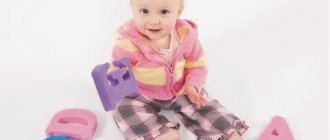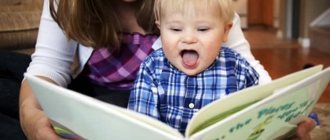Little explorers of the world are called “why girls”, they are interested in everything and with their questions and conversations they are able to “chat” the most patient mother. However, there are also silent people. Now all the peers are talking with all their might, but this kid doesn’t even say “mom.” From a certain age, this situation causes justifiable concern among parents.
When should a child start talking?
First of all, it is important for parents to understand that the child does not owe anything to anyone. It develops in accordance with its internal rhythm, which can differ greatly from the average statistical norms. It happens that a baby who uttered his first words very early will subsequently have a very slow expansion of his vocabulary. And vice versa, a silent person who looked like a black sheep compared to his peers can suddenly overtake them all.
When assessing your child’s progress, we recommend that you do not take the stories of your friends to heart: many mothers and fathers greatly exaggerate the successes of their child. It’s better to focus on the following key points of speech development (not forgetting that each baby’s schedule is individual).
| 2–4 months | Gurgling At this time, the baby begins to “walk” and “gurg.” He is not yet trying to speak, he is simply aware of the fact that certain movements of the speech apparatus can turn into sounds. That’s why “agu” is completely international—it’s a “word” that comes naturally when you open and close your mouth. |
| 6 months | Gurgling At this time, the baby begins to “walk” and “gurg.” He is not yet trying to speak, he is simply aware of the fact that certain movements of the speech apparatus can turn into sounds. That’s why “agu” is completely international—it’s a “word” that comes naturally when you open and close your mouth. |
| ~ 1 year | First words By his first birthday, the baby learns his first real words. Yes, these are rather primitive “mom”, “dad”, “woman”, but they are no longer just a set of sounds. The child understands the meaning and addresses them to specific adults. Soon the toddler's speech is replenished with other simple words. For example, he more or less clearly screams “oops” when he drops a toy, or “give” when he wants to get something. A baby's primary vocabulary usually consists of 5–10 words. |
| 1-1.5 years | Vocabulary expansion Every week the child pleases his parents with new words, but mom and dad cannot always understand the child’s “dialect.” The fact is that the baby already distinguishes many words in the speech of adults, but he cannot repeat them. So “porridge” turns into “ka”, “fell” into “apa”, “bird” into “tika”. Often, a child comes up with conceptual words that combine several objects at once, for example, he uses one syllable to designate everything soft and warm - from a blanket to a dog. The baby's set of first words is limited to nouns, verbs, and interjections. When assessing a child’s development, it is important for parents to first assess not the number of words he speaks, but the passive vocabulary that he clearly understands in adult speech. |
| 1.5-2 years | First proposals This is the period when children begin to speak more and more actively. The baby learns two very important words for communication - “yes” and “no”. He repeats what he hears, and may even remember entire phrases. The vocabulary expands significantly and reaches 250 or more words. It continues to be dominated by the names of surrounding objects and basic actions, but the first abstract expressions appear, for example, “hello” and “bye.” The baby understands that words work better together and learns to form the first sentences. They are quite short - only 2-4 words, but they allow you to clearly express your desires. |
| 2-3 years | Full speech The baby’s speech becomes almost adult, because after nouns and verbs the first words related to other parts of speech appear in it. The baby begins to use pronouns, and at the same time understands that objects have gender and number. He discovers adjectives and now not only names objects, but gives them characteristics. He masters question words and begins to constantly ask you about one thing or another. He is even able to figure out tenses, declensions and conjugations in his head, even if he doesn’t yet know what they are called. By the age of three years, you can fully communicate with your child, and the scope of conversations is not limited to the topics of “eating, playing, sleeping.” The kid knows 800–1000 words, can tell you what he did while visiting his grandmother, answer your questions and ask you a hundred times more. By and large, the child’s speech skills have developed. All that remains is to polish them by continuing to build your vocabulary and practice your pronunciation. |
1.6-2 years
The vocabulary is approximately 200 words, including adjectives. The child composes sentences of 3-4 words, but understands more complex sentences addressed to him. It is impossible to name the exact date when the child will begin to speak his first words.
Most often, impulsive speech develops between the ages of 1 and 1.6 years. If the child does not speak during this period, the next leap in speech development occurs at approximately the age of 2 years. At the turn of the first and second years of life, the baby usually says the word “mother” for the first time.
How to help your child say his first words faster?
Speech is closely related to intelligence, so many parents try to get their baby talking quickly and are very worried if he doesn’t want to do this. Today there are many methods for early speech development. You can choose and try one of them, but just don't overdo it. Sometimes too intense exercises have side effects - the child may withdraw into himself from information overload or stop being interested in the world around him, wanting to learn new words only from his favorite educational cartoons. To understand whether a developmental program is causing harm, carefully monitor your child’s behavior and emotional state, and regularly consult with a specialist.
In addition to the author’s methods, there are also universal tips that help parents hear the baby’s first words faster:
- Do not think that your baby will speak faster if you artificially reduce communication with him to the most primitive words. On the contrary, from birth, try to talk with your child on a variety of topics, even abstract ones.
- If your baby is not sleeping, talk to him constantly. Comment on your actions while playing, feeding or changing clothes. While walking, talk about everything you see - trees and flowers, roads and cars, rain and sun, butterflies and birds. Describe each item - what it does, what color it is, size, quantity, what it consists of, etc. If it is connected with something already familiar to the baby, point out this connection.
- Do not fix simplified forms of words in your child’s mind. If your child calls the cat “ko,” confirm that you understand him and say correctly: “yes, that’s a cat.” And, of course, do not invent such words yourself.
- When children begin to speak, it is important to give them opportunities to gain fresh knowledge. Do not limit yourself to the vicious circle of “house, park, playground.” Take your baby to children's events, the zoo, museums and other places where he can get new experiences.
- Read books to your child, show pictures and explain what is shown in them, sing children's songs, look for videos for children on the Internet. All this stimulates the baby’s interest in mastering speech, expands vocabulary and builds logical connections between various objects, actions, phenomena, and properties.
- Praise your child for his achievements. Even if they are very tiny.
First sounds
Every baby, when he is born, has only one way to talk to others, to tell them about his problems. This is crying. The first sound that the mother hears from the newborn indicates that he has arrived alive and unharmed in the new world. And from this very moment the baby’s continuous development begins, which will last for more than one year.
At first, the child speaks only the simplest sounds. At first it’s only vowels; after a few months, consonants are added to the baby’s arsenal, but it will still be a long time before he says “mom” consciously. Is it possible to teach him this? There are things that children learn exclusively on their own. However, parents may well push the child and contribute to the rapid development of the baby.
At what age should you worry if your child doesn't start talking?
Let us remind you once again: each child is an individual with his own individual characteristics. The age at which each stage of speech development occurs varies greatly among different children. If the baby said his first words a month or two later than normal, it’s okay. You can talk about a possible problem only if the baby is behind by a stage or more:
Why doesn't the child pronounce his first words?
If a child shows signs of speech delay, a medical problem must first be looked for. In addition to conditions associated with abnormalities of brain development (cerebral palsy, autism and others), these may be hearing impairment and physical defects of the speech apparatus - the larynx, vocal folds, pharynx, jaw muscles.
If they are ruled out, it is most likely a temporary psychological problem. The baby will outgrow it with the help of a speech development specialist. And then the parents will dream about something else - how to silence him 
When does a child start speaking if the family speaks two languages?
If a child is in a bilingual environment from birth, he will begin to speak later than his peers. But in both languages at once! The reason is obvious: the baby has to figure out on his own why adults pronounce certain sounds during different actions, and if they call one thing in two words, it is much more difficult to understand the mechanics of “speaking.”
It is not at all necessary that mom and dad speak different languages. The source of alternative linguistic knowledge can be a grandmother, a nanny, or older children in a nursery. If you want your child to know two languages from infancy, just be patient while waiting for the first words. But if your plans do not include teaching your baby the nanny’s native language or the grandmother’s special dialect, ask them to speak in the clearest Russian possible in the presence of the baby.
The baby learned his first words. What's next?
Speech is the basis of communication, which means that enormous opportunities open up for you to communicate with your child and teach him. Explain, tell, answer questions. And don’t forget in any case: it is important not only to talk, but also to listen, recognizing and taking into account the needs of the little person.
Recommendations for parents with speech pathology
Deviations can be noticed by kindergarten teachers, parents or a pediatrician. It is very important for parents to observe the child themselves and read more books about the development of preschoolers. The main principle in diagnosis is regular visits to the pediatrician. During the first year, you should go to the pediatrician every month. In the second year of life, the child is brought to the doctor once a quarter. The pediatrician will definitely see the pathology and tell the parents about it.
If there is a delay in speech development, you should contact a neurologist and speech therapist. Specialists will refer you for an examination to identify the cause of the disease. The speech therapist will conduct a speech therapy examination, begin classes, and give recommendations to parents on working with their preschooler at home.
The earlier disorders of speech and general development are identified, the easier it is to eliminate the pathology.
Consultation with a speech therapist is required for healthy children from the age of 3, and then annually until the age of 7. If deviations are detected earlier, specialist help is indicated before the age of 3.
Sources
- Wu Y., Li G., Zheng Y. . // Lin Chung Er Bi Yan Hou Tou Jing Wai Ke Za Zhi - 2021 - Vol35 - N4 - p.341-345; PMID:33794634
- Karcher NR., Loewy RL., Savill M., Avenevoli S., Huber RS., Simon TJ., Leckliter IN., Sher KJ., Barch DM. Replication of Associations With Psychotic-Like Experiences in Middle Childhood From the Adolescent Brain Cognitive Development (ABCD) Study. // Schizophr Bull Open - 2021 - Vol1 - N1 - p.sgaa009; PMID:32803159
- Skovlund E., Selmer R., Skurtveit S., Brandlistuen RE., Handal M. In utero exposure to analgesic opioids and language development in 5-year old children. // Pharmacoepidemiol Drug Saf - 2021 - Vol29 - N6 - p.736-744; PMID:32383248
- Yi YG., Lee DW., Kim J., Jang JH., Lee SM., Jang DH. Two Novel Mutations (c.883-4_890del and c.1684C>G) of WDR62 Gene Associated With Autosomal Recessive Primary Microcephaly: A Case Report. // Front Pediatr - 2021 - Vol7 - NNULL - p.457; PMID:31788460
- Llaci L., Ramsey K., Belnap N., Claasen AM., Balak CD., Szelinger S., Jepsen WM., Siniard AL., Richholt R., Izat T., Naymik M., De Both M., Piras IS., Craig DW., Huentelman MJ., Narayanan V., Schrauwen I., Rangasamy S. Compound heterozygous mutations in SNAP29 is associated with Pelizaeus-Merzbacher-like disorder (PMLD). // Hum Genet - 2021 - Vol138 - N11-12 - p.1409-1417; PMID:31748968
- Wu Y., Li G., Ma Y., Zheng Y. . // Lin Chung Er Bi Yan Hou Tou Jing Wai Ke Za Zhi - 2021 - Vol33 - N10 - p.918-922; PMID:31623034
- Botticelli S., Küseler A., Mølsted K., Andersen HS., Boers M., Shoeps A., Emborg BK., Kisling-Møller M., Pedersen TK., Andersen M., Willadsen E. Influence of Infant Cleft Dimensions on Velopharyngeal Function in 5-Year-Old Danish Children Born With Unilateral Cleft Lip and Palate. // Cleft Palate Craniofac J - 2020 - Vol57 - N4 - p.420-429; PMID:31505955
- Salvago P., Gorgone E., Giaimo S., Battaglia E., Dispenza F., Ferrara S., Martines F. Is there an association between age at first words and speech sound disorders among 4- to 5-year-old children ? An epidemiological cross-sectional study based on parental reports. // Int J Pediatr Otorhinolaryngol - 2021 - Vol126 - NNULL - p.109602; PMID:31374388
- Ingram SB., Reed VA., Powell TW. Vowel Duration Discrimination of Children With Childhood Apraxia of Speech: A Preliminary Study. // Am J Speech Lang Pathol - 2021 - Vol28 - N2S - p.857-874; PMID:31306605
- Dawes E., Leitão S., Claessen M., Lingoh C. Oral literal and inferential narrative comprehension in young typically developing children and children with developmental language disorder. // Int J Speech Lang Pathol - 2021 - Vol21 - N3 - p.275-285; PMID:31159597
Achievements up to six months
During the first month of life, the baby learns to respond to the speech of adults. Often children walk parallel to the conversations of adults. This happens especially often if parents talk to the baby and address him. Begins to distinguish intonations: the mother’s affectionate address helps to calm down faster, screams and aggression are frightening and can cause crying.
By 3 months, the first syllables appear. They are simple, consisting of a small number of sounds. You can hear “ua”, “gu”, “ga”.
By 4-5 months, baby talk acquires an emotional connotation. The child does not just sing or squeal: you can distinguish the intonation with which the sounds are pronounced. Reacts well to adult speech, understands intonation better; When a child hears a sound, he can turn his head correctly in the direction of its source.
At the age of six months, children recognize their parents' voices well, even with a large number of people around. Syllables vaguely reminiscent of “ma” and “pa” slip into speech. They will become clearer only closer to 7 months.
What to do if your baby speaks poorly?
If deviations are noted, lack of the required level of development when the child should start speaking, you need to go to the pediatrician. The doctor will rule out medical causes or prescribe appropriate treatment.
You should talk more with the baby from the first days of life. There is no need to lisp: the child must hear the correct pronunciation of words in order to pronounce them without mistakes in the future.
During the conversation, you should try to interest the child: you need to speak emotionally. In the evening you should read books or tell fairy tales of your own composition.
If the oral apparatus is poorly developed, special exercises are selected to help strengthen weak muscles. It is useful to blow, whistle, and draw in air.
Regular physical activity will help develop mental abilities. You should dance with your child more often, sing, and develop fine motor skills with the help of special toys, games, finger exercises, and massage of the inside of the palms.








